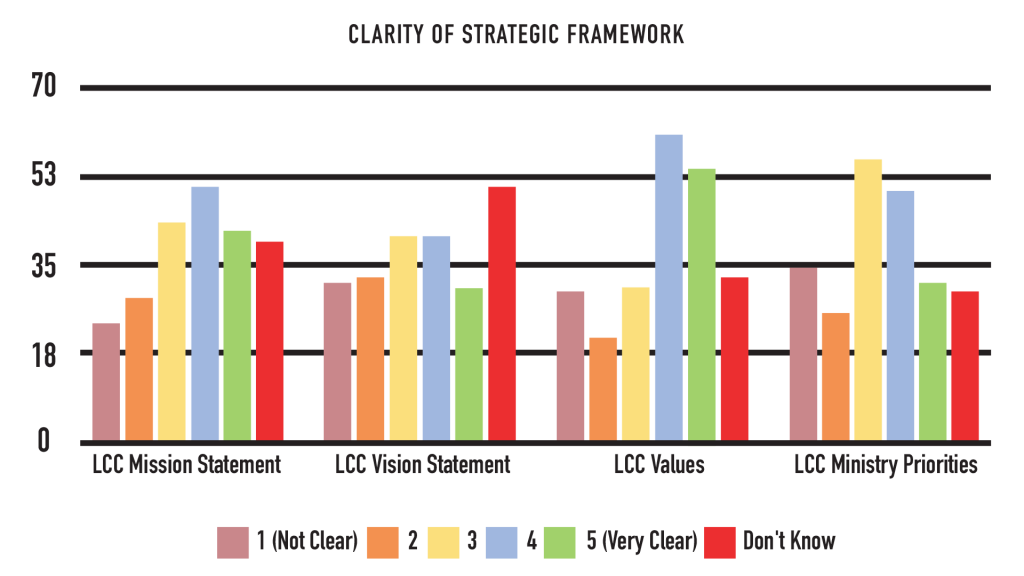Advancing the Mission & Ministry of LCC: Progress update
 by David Friesen
by David Friesen
CANADA – Back at the 2022 Lutheran Church–Canada (LCC) Synod Convention in June, David Friesen, LCC Director of Advancement, and Alan Zacharias, president of Zacharias Advancement Consulting, shared the results of the exciting planning process that LCC has been engaged in since the middle of 2021. If you have not had a chance to view this presentation, you can find it on LCC’s YouTube Channel Here, or by visiting the Purpose and Priorities Planning webpage under the “News” tab on LCC’s website. As you may have read in previous issues of The Canadian Lutheran and on CanadianLutheran.ca, the goal of this planning process was to create a shared vision for the future of our church body—to direct, strengthen, and sustain our overall mission and ministry today and tomorrow.
The foundation for this work stemmed from feedback we received through the many voices of our pastors, deacons, and laity, synodical leadership, and the LCC Board of Directors. Looking at the major components of mission, vision, values, and ministry priorities, we found quite a variation in how LCC is viewed. The graph included in this article provides a visual representation of all the responses in these areas.

Of course, in a perfect world, we would like all the responses to be green (“very clear”) in each of these areas. However, what we learned was that many people were unclear on these things or simply didn’t know. If our goal is to direct, strengthen, and sustain our overall mission and ministry, we first needed to do some work in these areas.
Following the development of our Strategic Framework, the next step was to establish initiatives which answered the most critical issues as defined by the goal statements. In review, the goal statements focused on six key areas:
1.Disciple-Making Culture:
Serve, support, and equip congregations and partner ministries for mission and discipleship.
2. Mission Outreach:
Pursue bold domestic and international outreach and ministry.
3. Equip Leaders:
Recruit, educate, and support ecclesiastical, diaconal, and lay leaders for the church.
4. Organizational Effectiveness:
Use and strengthen synodical structure, services, and processes to foster unity, transparency, and relationships.
5. Fiscal Resources and Responsibility:
Gather, manage, and allocate financial resources to increase and optimize mission impact.
6.Strategic Communications:
Cultivate open, consistent communications to inform, engage, and encourage awareness and response throughout the synodical family.
Each of these strategic initiatives support a goal statement and become part of LCC’s four-year workplan with an aim to answer the question, “How can LCC and its agencies better partner with you and your congregation?” The PPP committee, LCC leadership and staff, and the Board of Directors, have been involved in developing these initiatives since convention. Strategic initiatives are time sensitive, quantifiable, and have responsible parties involved in delivering the key intended outcomes over the quadrennium. These outcomes include:
- A focused approach and plan that aligns resources and builds unity throughout LCC.
- Support to all congregations, including small, rural, and struggling parishes, providing programs, training, and encouragement to develop lay leadership, volunteers, and inter-congregational engagement.
- A communication strategy to build awareness of LCC’s mission and ministry and encourage engagement in the same.
- A review of how our new structure is working and, where necessary, develop improvements to this structure to enhance the work we do together.
- An expansion of pastoral formation options and pastoral/church worker recruitment efforts to better serve parish needs.
- Development of a long-term funding model to maintain and increase the mission and ministry efforts of our synod.
Although not all initiatives are currently established, the following are more immediate initiatives pertaining to each goal statement, with implementation dates beginning in 2023.
Disciple-Making Culture
- Develop a congregational assessment and revitalization process to assist congregations at varying stages of development.
- Work with congregations to identify and develop approaches to mission outreach in their area.
- Strengthen relationships between Director of Missions and partner ministries to build a stronger, coordinated outreach to Indigenous and underserved urban communities.
Mission Outreach
- Call an Associate Director of Missions.
- Identify the top three underserved immigrant groups in areas where LCC has an existing congregation for possible mission expansion.
- Promote opportunities for partnership with individuals to support specific missions.
- Identify three prospective mission fields for Indigenous ministry.
Equip Leaders
- Launch monthly Zoom calls on current, important topics, to be led by an expert chosen by Synod leadership, which are open and available to anybody within LCC in which to participate.
- Develop new protocols within the Pastors with Alternate Training (PAT) program to train up pastors for unique, small congregation circumstances.
- Define the role of Director of Young Adult and Youth Ministry so that one can be called.
Organizational Effectiveness
- Identify key areas of synodical staffing needs and develop a staffing plan (to better serve congregations and members).
- Develop clear job descriptions and succession plans for all synodical positions.
- Create a calendar of national events and activities to strengthen unity and inter-congregational relationships.
Fiscal Resources and Responsibility
- Coincide Annual General Meeting with release of Annual Report ensuring timely, accurate, and transparent information is being released from the previous fiscal year.
- Develop and implement a synod-wide program to encourage, engage, and increase congregational remittances.
- Develop improved procedure to allocate and distribute financial resources to support domestic missions (and ministry).
Strategic Communications
- Identify at least one lay representative from each congregation to receive all communications from the national office.
- Create an annual communications and direct mail calendar designed to engage congregations, laity, pastors, and church workers.
- Create annual report on mission needs and congregational remittances to increase awareness and response to support mission and ministry.
Updates on these initiatives will be provided on a quarterly basis. This process is ongoing and as some initiatives are completed, new ones will begin. We value your feedback and we especially value your continued prayers for this process and your synod. You can connect with David Friesen via email dfriesen@lutheranchurch.ca or by phone at (204) 791-9949. If you would like David to come speak to your congregation, please let him know.
———————





